A New Monastic Residence Arises in Olympia
Written by: Ayyā Suvijjānā
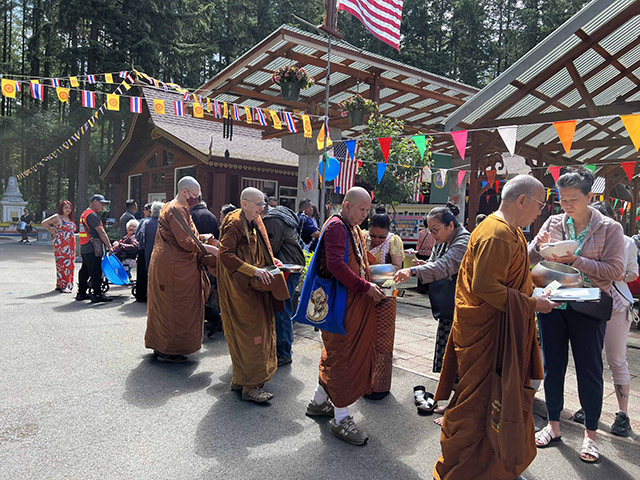
Ayyas Suvijjānā and Niyyānika Bhikkhunīs were welcomed to the 25th anniversary of Buddhangkura Buddhist Temple in Olympia.
Photos by: Clear Mountain, Barb Craven, Chia_w_gcea, Holly Griswold, Andrew Rineheart, Linda Ward, Kat Woods
Two Buddhist bhikkhunīs in the Theravāda tradition have this year launched a small monastery named Passaddhi Vihara. The word bhikkhunī generally means female monastic or alms mendicant. In Passaddhi Vihara’s case, one monastic identifies as female, and one as non-binary.
The name Passaddhi Vihara means Serene Dwelling in Paḷī. Passaddhi is also translated as tranquility and calm. The bhikkhunis’ intention is to dwell simply in dedication to bhavana (inner development) leading to the liberation of nibbāna, the heart’s release. Supporters are generously providing lodging for Bhikkhunīs Ayyā Suvijjānā and Ayya Niyyānika in a two-bedroom apartment in West Olympia in Washington State.
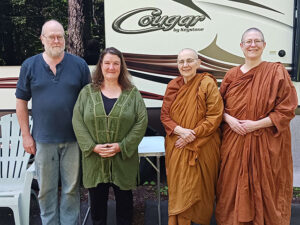
In Passaddi Vihara’s first phase the focus is on monastic development, creating a good framework for the monastery, and community dhamma programs. The bhikkunis have already launched online dhamma sharing and sutta studies, and some in-person and online short retreats. People around the Pacific Northwest are invited to participate in the dhamma programs, and to support the monastery through alms rounds and the website. The monastics will also continue to offer dhamma at other venues as invited.
Passaddhi Vihara intends to provide training for aspirants on the path to full ordination. “The more we deepen in dhamma, the more we will be able to offer to those aspiring to join us,” said Ayyā Suvijjānā. This will happen when supportive conditions arise, including moving to a larger dwelling and purchasing property.
Beginnings in Washington State
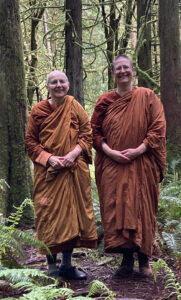
Ayyā Suvijjānā and Ayya Niyyānika arrived in Seattle on April 24, 2024, and were hosted at a friend’s home in the city for a week. During that week they accepted an invitation to Clear Mountain Monastery’s Saturday gathering, where they offered a guided meditation and a talk based on a theme from the “Dhammapada.” Two days later they joined Clear Mountain co-founder Ajahn Nisabho, on the Clear Mountain Monday morning alms round in Seattle.
On May 1, Ayyā Suvijjānā and Ayya Niyyānika left Seattle to search for an affordable private but accessible rental dwelling in the Olympia area, to begin phase one of their vision. Friends invited them to stay in their travel trailer, on the friends’ rural property outside Olympia. With the help of these friends and others, the two bhikkhunis found an appropriate rental in less than two weeks.
“We felt the devas were blessing us, because the place fits our criteria and we found it so quickly,” said Ayyā Suvijjānā.
Another step was building connections with the local Theravada temples, which Ayyā Suvijjānā said went well from the start.
“Meeting Abbot Phra Ajahn Ratsamee and the other bhikkhus at Wat Buddhangkura, the Olympia Thai temple, was deeply nourishing. There we were welcomed as monastic saṅgha, and received kind and supportive advice and connection to other temples in the area. The abbot at the Khmer Temple in Tacoma was also very welcoming and included us in the alms round there, which was a blessing,” said Ayya Niyyānika.
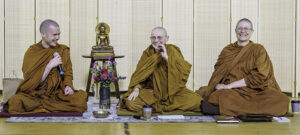
“Coming back to Passaddhi Vihara after a morning that included time at both the Khmer and Thai temples, I felt so supported,” said Ayya Niyyānika. “My heart was warm and ready to abide in meditation. I felt the support was for the aim of monastic life, not just so that monastics share dhamma, which we gladly do, but also that we go to the root of a tree for the right ending of suffering.”
(This is a reference to the Buddha’s repeated injunction to monastics to go meditate. In AN 3.40, he said, “A mendicant has gone to a wilderness, or to the root of a tree, or to an empty hut, and reflects like this: ‘I was swamped by suffering, mired in suffering. And I thought, Perhaps I can find an end to this entire mass of suffering.’”)
The monastics have as well begun connecting with other Buddhist leaders from other traditions in the area.
Some History
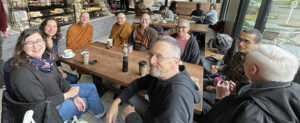
Ayyā Suvijjānā and Ayya Niyyānika received initial training and full ordination at Dhammadharini Monastery in California, with Ayyā Tathālokā Therī as preceptor.
After becoming independent bhikkhunīs, they each independently traveled, practicing at monasteries in the United States and other countries.
In May of 2023, while Ayyā Suvijjānā was at Empty Cloud Monastery in New Jersey, and Ayya Niyyānika was at Tilorian Monastery in Belgium, the two discussed their respective goals. They then decided to join together to realize the vision of a new Western Washington vihara, dedicated to practicing toward liberation.
Before making a final decision about this vision, the Bhikkhunis consulted with other Western Theravada monastics in the Pacific Northwest, including Ayya Ānandabodhī Bhikkhuni of Parayana Vihara in Port Townsend, and Ajahn Kovilo Bhikkhu and Ajahn Nisabho Bhikkhu of Clear Mountain Monastery in Seattle, all of whom are establishing monastic communities. All of them very much encouraged starting a vihara in the Olympia area.
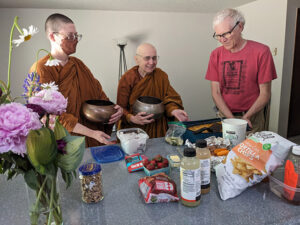
Ayya Ānandabodhī shared with Ayyā Suvijjānā the image of a seedpod bursting open and scattering seeds, and the seeds landing and sprouting. Her image represents the spread of the sangha, and the growth of each community, in the fertile dhamma soil of the Pacific Northwest. She was also pleased with the location in Western Washington, because it takes at least four bhikkhunis to do certain formal legal actions within the bhikkhuni sangha.
Ajahn Nisabho called Passaddhi Vihara a beautiful addition to the growing constellation of Western Theravada monastics around Seattle. Ajahn Nisabho’s image refers to the steady presence of each dhamma community, as a network of stars making up a larger dhamma constellation.
This network will be mutually supportive of each unique node of the Pacific Northwest Sangha constellation, in ways that lead to growth in the dhamma. At Passaddhi Vihara we intend to train aspirants on the path to full ordination, once we have the right conditions to do so.
Moving forward
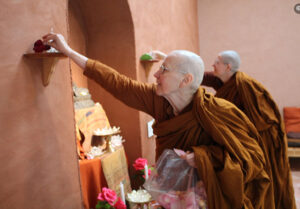
Part of Passaddhi Vihara’s vision is to share dhamma based on the teachings from early Buddhist texts through community teachings and programs. They had a wonderful start. As soon as the bhikkunhis arrived in Washington, they received three invitations to cover in-person teachings for Clear Mountain Monastery in May and June. They were also invited to deliver a talk at a monthly daylong meditation for a small group of people in a private residence.
For the current schedule of in-person and online dhamma sharing, sutta study (the Buddha’s teachings from the early Buddhist texts), and day or weekend retreat programs, please visit Passaddhi Vihara’s website.
“We rejoice together in the goodness and support already arising,” said the bhikkhunīs. “We look forward to developing Passaddhi Vihara in line with the Buddha’s teaching for these next six to 12 months in a rented apartment, and then into whatever emerges from our efforts together.”
Here are several clarifying definitions:
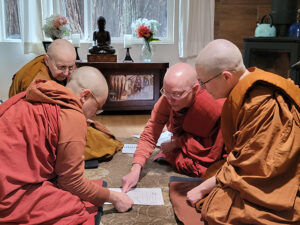
Bhikkhunī or bhikkhu both mean mendicant or monastic, in the Theravāda Buddhist tradition. We have the same basic role as celibate alms mendicants. The Pali language uses male and female forms for words. Please use “Bhikkhuni,” “monastic,” or even “monk,” to refer to us. Please don’t use the word “nun.”
In Southeast Asia, the word nun carries a different meaning than one who is fully ordained. There are many forms of eight-precept or 10-precept female renunciates, which developed because full ordination for women was banned in Southeast Asian countries. According to the early Buddhist texts, the monastic sangha led by the Buddha included both bhikkhus and bhikkhunīs.
Passaddhi Vihara means serene dwelling in Pali. Passaddhi is also translated as tranquility, calm, and peaceful. Vihara is translated as dwelling or abiding, thus indicating a physical dwelling place, or a mental state, as in the Brahmaviharas.
Passaddhi is one of the seven factors for awakening. The name supports our vision of the new dwelling, as a peaceful place to support the practice for awakening.
Ayyā Suvijjānā began practicing Zen meditation in 1976. Her Theravada monastic training started in 2006, and she has been a bhikkhunī since 2010.
Ayya Niyyānika has been a bhikkhuni since December 2017. They started monastic training in 2014.
